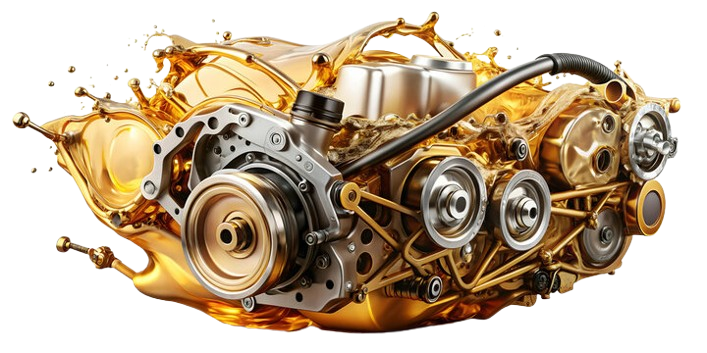Engine oil is one of the most critical components for the proper functioning of any vehicle or machine. It plays a crucial role in lubricating the engine’s moving parts, preventing overheating, and ensuring optimal performance over time. Without high-quality engine oil, an engine is prone to wear, friction, and even severe damage, ultimately reducing its lifespan. In this blog post, we will explore the functions of engine oil, the different types available, and some key maintenance tips to keep your engine running smoothly.
What Is Engine Oil?
Engine oil is a lubricant designed to reduce friction between the moving parts of an engine. It is made from a combination of base oils (either mineral or synthetic) and various additives that enhance its performance. These additives can include detergents, dispersants, anti-wear agents, and antioxidants, all designed to improve the oil’s ability to protect the engine and function under high temperatures.
At its core, engine oil serves three key purposes:
- Lubrication: Engine oil forms a thin layer between moving engine components, reducing direct contact and friction. This helps prevent parts from wearing down quickly.
- Cooling: By dissipating heat, engine oil helps prevent the engine from overheating. The oil absorbs the heat generated by the engine’s moving parts and carries it away, reducing the risk of damage from excessive temperatures.
- Cleaning: Engine oil also helps keep the engine clean by picking up dirt, debris, and carbon buildup, which can clog engine parts and degrade performance.
Types of Engine Oil
Engine oils are typically categorized into three broad types based on their base oils: Mineral Oil, synthetic oil, and semi-synthetic oil. Each type has its own advantages, depending on the type of engine and driving conditions.
1. Mineral Oil (Conventional Oil)
Mineral oil is produced by refining crude oil through a distillation process to remove impurities and create a usable liquid. It is the most basic and commonly used type of engine oil. While it’s suitable for standard vehicles that don’t experience extreme conditions, it tends to break down faster and requires more frequent changes compared to synthetic oils.
- Advantages:
-
- Affordable and widely available.
- Suitable for older vehicles or those with less demanding engine requirements.
- Performs well in moderate driving conditions.
- Disadvantages:
-
- Breaks down more quickly at high temperatures.
- Doesn’t offer the same level of protection or efficiency as synthetic oils.
- Requires more frequent oil changes.
2. Synthetic Oil
Synthetic engine oil is chemically engineered to provide superior protection for engines. It is designed to perform better at high temperatures, offer enhanced lubrication, and reduce engine wear. Synthetic oils are ideal for modern, high-performance engines or vehicles that require heavy-duty usage.
- Advantages:
-
- Superior protection at extreme temperatures and under heavy loads.
- Longer intervals between oil changes (can last up to 15,000 miles, depending on the vehicle).
- Improved fuel efficiency and performance.
- Disadvantages:
-
- More expensive than conventional oils.
- Not necessary for older engines or vehicles that don’t require high-performance oil.
3. Semi-Synthetic Oil
Semi-synthetic oil is a blend of mineral and synthetic oils, designed to offer a balance between performance and cost. It combines the benefits of synthetic oil, such as better high-temperature stability, with the affordability of conventional oils.
- Advantages:
-
- More affordable than full synthetic oils.
- Better protection and performance than mineral oils.
- Suitable for a wide range of engines.
- Disadvantages:
-
- Doesn’t provide the same high-level protection as full synthetic oils.
- Requires more frequent changes than synthetic oils.
Viscosity and Oil Grades
One of the most important aspects of engine oil is its viscosity, or thickness. The viscosity of oil indicates its ability to flow smoothly at various temperatures. Oils with higher viscosity are thicker and provide better protection against engine wear, but they can also cause the engine to work harder, especially in cold weather. Oils with lower viscosity flow more easily, offering better fuel efficiency, but they may not provide the same level of protection in high-temperature conditions.
When to Change Engine Oil
One of the most critical aspects of maintaining an engine is ensuring that the oil is changed regularly. Over time, engine oil breaks down and loses its ability to lubricate and protect the engine properly. It can also become contaminated with dirt, carbon buildup, and other debris.
- Typical Oil Change Intervals:
- Mineral Oil: Every 3,000 to 5,000 miles (4,800 to 8,000 km).
- Synthetic Oil: Every 7,500 to 10,000 miles (12,000 to 16,000 km).
- Semi-Synthetic Oil: Every 5,000 to 7,500 miles (8,000 to 12,000 km).
However, these intervals can vary depending on the manufacturer’s recommendations and the type of driving you do. If you frequently drive in stop-and-go traffic, tow heavy loads, or drive in extreme temperatures, you may need to change your oil more often.
How to Maintain Your Engine Oil
To ensure your engine oil stays in optimal condition, here are a few maintenance tips:
- Check Oil Levels Regularly: Make it a habit to check the oil level at least once a month Insufficient oil levels can result in poor lubrication, potentially leading to engine damage.
- Look for Oil Leaks: If you notice oil spots on your driveway or the underside of your car, it could indicate a leak. Address leaks immediately to avoid running the engine with insufficient oil.
- Change Oil Filter: Along with the oil change, it’s important to replace the oil filter. A clogged filter can reduce oil flow and negatively impact engine performance.
Conclusion
Engine oil is more than just a lubricant; it’s the lifeblood of your vehicle’s engine. It not only reduces friction and wear but also keeps the engine cool and clean, ensuring it operates smoothly. Choosing the right oil and maintaining proper oil change intervals are crucial to extending the life of your engine and improving overall performance.
Visit Us For More Details : https://moonlitempower.site/
